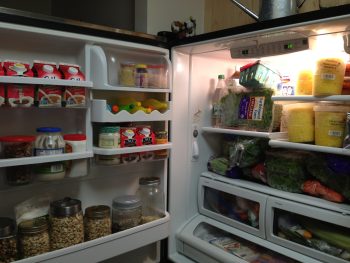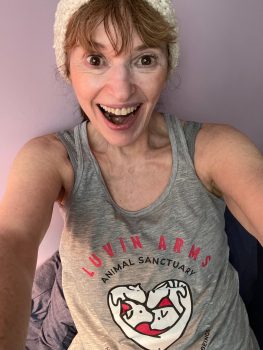At a hotel cafe in Aspen, I saw a man order a coffee to go. It came in a Styrofoam cup, and he asked if there was any alternative. He was told there wasn’t and, as an environmentalist, he refused the coffee. I was impressed. Most coffee drinkers need that morning Joe, but his principles said he couldn’t drink it if it came in a container that would live in a landfill for 500 years. It’s inconvenient to be a committed environnmentalist, and it can be inconvenient to be a vegan.
I’ve spent 40 years telling people how great a cruelty-free life can be:
- To stop eating our fellow creatures is a moral imperative ✓
- Plants heal ✓
- Being vegan shrinks your carbon footprint to a size 2 ✓
- You’ll free up food to feed hungry people ✓
- A kind diet supports spiritual growth ✓
- It’s really easy . . . Actually, I have rethought this particular checkmark.
Almost anything you truly believe in is easy, fun, and rewarding, but if you’re not all in, any permutation of “plant-based” becomes––with apologies to Al Gore––an inconvenient diet. Despite the rise in vegan restaurants and products, living this lifestyle is not the norm and when we interact with the not-yet-vegan world, there are annoyances. If you’re vegan, you’ve probably experienced similar ones:
- You’re out somewhere and the closest thing to non-dairy milk is “creamer”––not vegan
- The breakfast burrito ingredients are clearly posted: onions, peppers, red beans, salsa; but it comes full of scrambled egg
- The elegant cotton suit jacket you’re about to buy turns out to be 19 percent wool
- The menu at that trendy chain was one-third vegan before the pandemic; all that’s left now is lentil soup, lentil salad, and a blueberry muffin
- Your “special meal” didn’t make it onto the plane and Heathrow is across an ocean
- At the devoutly vegetarian yoga center, the proffered snack at the retreat is cheese bread.

Not one of these is major, but when they happen over and over, they’re enough to cause people who aren’t fully committed to return to their former habits. They’re unlikely to give “inconvenience” as a reason, and are more likely to say that they gave up on veganism because they felt a bit “off” physically. They gained weight (or lost too much). They were tired (or anxious). They felt hungry (or ran out of ideas for what to eat). Their doctor or their acunpuncturist or an article they read warned against eating plant foods only. Friends kept telling them they weren’t fun anymore. They started to think that eating vegan was elitist, since not everyone has the option. While there may be some truth these, they often cover the real reason many people return to animal products: the little inconveniences add up. And they’re often not expected since the person who introduced them to veganism––maybe me, maybe you––promised that it would be easy.
I don’t do that anymore. Lately I’m making a point not to promise what I can’t deliver: simple, seamless vegan living. Simpler and closer to seamless than it was when I started out? Good heavens, yes! But it’s not yet the norm out there in the world and a lot of the people a new vegan will confront still don’t get it.
- Is this vegan? “I’m not sure. It’s gluten free, though.”
- Can I order the spaghetti without the meatballs? “Yeah, but it costs the same.”
- Can I work with a trainer without getting their take on nutrition? “Absolutely. Thanks for your payment. Here’s your nutrition guide.”
Those of us who have been vegan for awhile take all this in stride. It can be tough for newbies, though, especially those who are devastated by “standing out” or feeling that they’re making a fuss. These days, then, I don’t negate the challenges. When someone says, “Being vegan must be really hard,” I say, “Not once you know what you’re doing. It can be inconvenient, though, but I’d rather put up with some inconvenience than expect an animal to put up with torture. So, yeah, you may sometimes have to drink your coffee black or find only one suitable entree on a menu––and even that one may call for an edit or two, but when you think about why you’re doing this, who you’re doing it for, and the amount of suffering you’re alleviating, you’ll be happy to do whatever it takes. And you’ll feel really proud of yourself.”
 I also emphasize that although we do all we can to get this right in every circumstance, sometimes the barista will goof or the shredded cheddar you asked not to have shows up on your salad. At these times, I think it’s important to be low-key and civil. We have the option of screaming about the mammary secretions of enslaved cows––that’s certainly what dairy is––and we have the option of saying, “Oops, I think this has cow’s milk: I ordered soy.” The latter option makes sense to me. Just saying the phrase “cow’s milk” instead of “regular milk” speaks volumes. Most people who still consume dairy don’t think about its coming from a cow. You just woke somebody up.
I also emphasize that although we do all we can to get this right in every circumstance, sometimes the barista will goof or the shredded cheddar you asked not to have shows up on your salad. At these times, I think it’s important to be low-key and civil. We have the option of screaming about the mammary secretions of enslaved cows––that’s certainly what dairy is––and we have the option of saying, “Oops, I think this has cow’s milk: I ordered soy.” The latter option makes sense to me. Just saying the phrase “cow’s milk” instead of “regular milk” speaks volumes. Most people who still consume dairy don’t think about its coming from a cow. You just woke somebody up.
In the case of the salad, you can ask for another one or just remove the cheese as best you can. Doing the former doesn’t make you a better vegan, since they’ll throw that salad out and the cheese will be “eaten” by the garbage can. In cases of inconvenience, the task is simply to make the best of things. Don’t eat anything you don’t want to eat. You have every right to ask for what’s appropriate, but none of us has the right to rant about it. If there is a way to speak up for the animals in a manner that won’t do more harm than good, take that opportunity. Sometimes it’s as simple as choosing the right words, as in the example of saying “cow’s milk,” or “I’m so sorry if I wasn’t clear: I’m a vegan and don’t eat anything taken from an animal.” That word “taken” flies in the face of what we were taught, that animals “give” their milk, their eggs, and their lives.
Is it sometimes inconvenient to take the high road? Yes, often: that’s why so few people are on it. Give yourself credit by saying, “I don’t care if it’s not easy all the time. It’s the right thing to do.” And people are watching. We think of influencers as photogenic super-humans with huge followings, but doing something just a tiny bit noble makes you an influencer, too. Do you know when I saw that man in Aspen who skipped his morning coffee? 1993––over 30 years ago! And after all this time, I still remember witnessing a stranger demonstrate the courage of his convictions, and I’m sharing what he did with you. Somebody will share what you do, too. When you’re calm and kind and classy, inconveniences be damned, there’s no end to what you can do and what you can model for others.
 Victoria Moran (www.victoriamoran.com) is the NYC-based author of The Love-Powered Diet, Main Street Vegan, and in January 2025: Age Like a Yogi. She hosts The Main Street Vegan Podcast (on all platforms) and The Main Street Vegan Salon, a celebrity talk show on Unchained TV (www.unchainedtv.com, and the UnchainedTV app). Moran is also the director of Main Street Vegan Academy, training Vegan Lifestyle Coach/Educators since 2012 (www.mainstreeetvegan.com).
Victoria Moran (www.victoriamoran.com) is the NYC-based author of The Love-Powered Diet, Main Street Vegan, and in January 2025: Age Like a Yogi. She hosts The Main Street Vegan Podcast (on all platforms) and The Main Street Vegan Salon, a celebrity talk show on Unchained TV (www.unchainedtv.com, and the UnchainedTV app). Moran is also the director of Main Street Vegan Academy, training Vegan Lifestyle Coach/Educators since 2012 (www.mainstreeetvegan.com).
